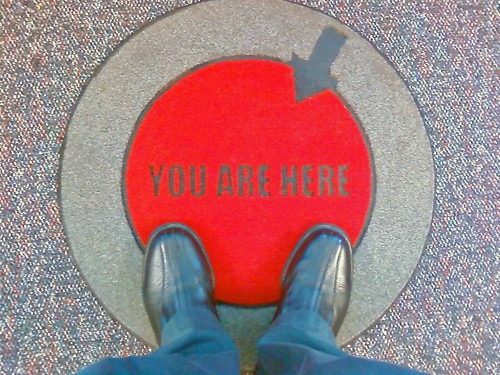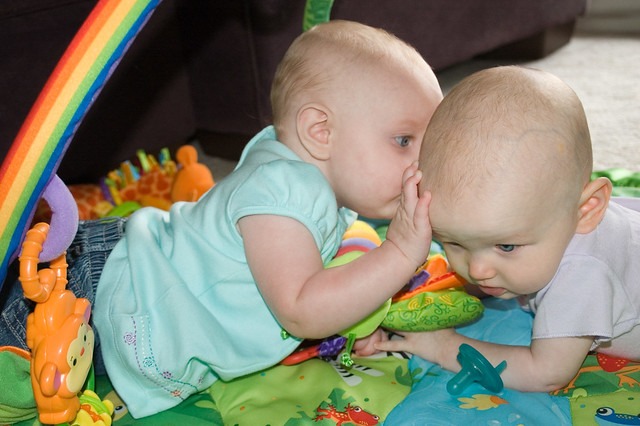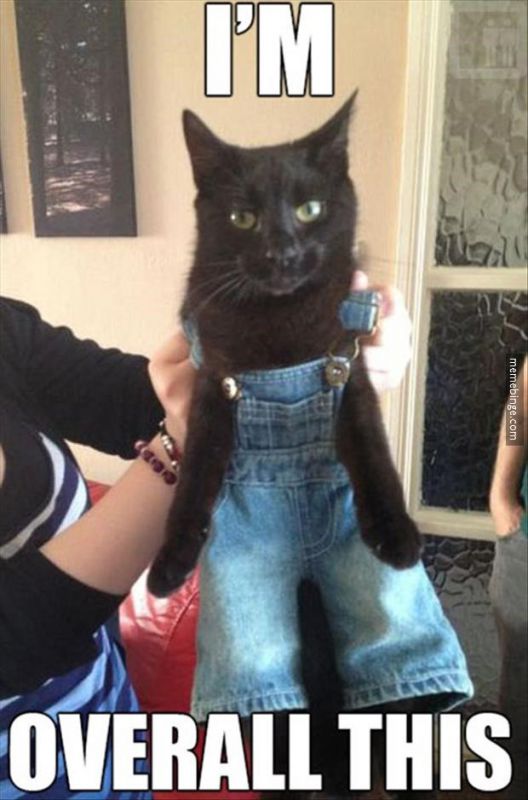
Learning Outcomes
In this chapter, you will learn
- why this class is important
- how you can benefit from becoming a better writer
- which disciplines are part of the social sciences
- how knowledge is created in the social sciences
- what constitutes a discourse community
- how writing in the social sciences is distinctive from other disciplines.
1.1 You Are Here
 Know where you are so you can know where you're going. Photo by joelogon on flickr
Know where you are so you can know where you're going. Photo by joelogon on flickrHere you are in a class about Writing in the Social Sciences. Are you wondering what you're doing here? What's the point of this class? Is it just another hoop to jump through before graduating? Didn't you already take a writing class as a freshman? Haven't you already learned how to write papers in your other classes? Isn't that good enough?
My answer to that is, sure. It's good enough if you're okay with just being okay. If your favorite emoji is the "meh" emoji; if you want to spend your whole life jumping through hoops rather than calling the shots; if you never want to get a raise or win friends and influence people. Or if you identify with this baby (see awesome photo):
 Is this your Writing Spirit Baby? Photo by greychr on flickr
Is this your Writing Spirit Baby? Photo by greychr on flickrBut wouldn't it be amazing if your words could actually change people's minds? (Like your boss's mind about that raise?) What about changing people's lives? What if you could not only find answers to real-life problems but also share your work with others so they make a difference in the world? Or what if you just want to express yourself better to that cute student across the room? Or what if you want to convince your city to move a walking path that juts into your property because you want to install a fence and you don't have the tools or permission to move it? (This may or may not be based on a real life example from my backyard.) All of these things and more can be yours if you learn how to up your game as a communicator. And that takes practice—thus, this class.
 Secret: Even babies know how important communication is. Photo by Andrew Bardwell on flickr
Secret: Even babies know how important communication is. Photo by Andrew Bardwell on flickrLet me tell you a secret: you will spend most of your life communicating. Even those of you who chose your college major thinking that you wouldn't have to write a lot (geography, anyone?) will spend most of your work life communicating—reading, speaking, and writing. Trust me; you might not believe it now, but go talk to someone who has the job you want someday, and you'll find out just how much of their work life involves communication. (Spoiler alert: it's a lot.)
Not only that, but you'll probably spend much of your personal life communicating, too. What's that, you say? You plan to spend most of your personal life sitting on your couch at home in front of a screen and never seeing any people?
 Ah, Cat Memes! They're communication, too. Photo by Meme Binge on flickr
Ah, Cat Memes! They're communication, too. Photo by Meme Binge on flickrWell, I have news for you: you still can't avoid communication. In fact, everything on that screen involves some form of communication—that movie was written and produced by people for people. That video game, too. Even that cat meme you're chuckling at was created by a person to make an impact. And the minute you click "share," presto! You're communicating right back. You can't help it. Because you're human (I'm assuming you're human), and that's what humans do. In fact, you might even say that communication is one of the main things that make us human.
So you might as well get good at it, right? And that's where this class comes in. If you'll dig in and work hard, you'll learn those awesome communication skills we were talking about and you'll get lots of good practice communicating so you can make a difference in this world. And then you can be a better human and help other humans be better humans, too. And isn't that what you came here to college study anyway? Humans? Are you sick of the word "human" yet? You'd better not be if you're going into the social sciences because that's what they're all about.
I'm Majoring in Humans
To be more specific, this book is geared toward anyone majoring or minoring in the social sciences. What are the social sciences, you ask? They're just that: sciences (aka fields of study) that deal with social-ness (aka people and how they act or interact). Therefore, if your major has to do with people or if you're a person, you're welcome in this class. Here are some of the typical examples of social sciences.
- Anthropology
- Archaeology
- Communication Studies
- Economics
- Education
- Family Science
- Geography
- History
- Law
- Linguistics
- Political Science
- Psychology
- Sociology
But don't think we stop there. Many other fields involve the study of people and therefore fit into the social sciences while also overlapping with other fields such as the hard sciences or business:
- Advertising
- Communication Disorders
- Exercise Science
- Health Studies
- Marketing
- Nutrition Science
- Public Administration
- Public Health
One easy test to see if you're part of the social sciences is if your field uses the APA Manual (aka the Publication Manual of the American Psychological Association ) as its chosen Style Guide. (If you don't know what I'm talking about, no worries. We'll talk more about that later in Chapter 8). Not every single social science uses it—some use the Chicago Manual of Style or other guides—but the majority use APA.
Welcome to My Parlor
Now that we've established that you're in the right place, let me tell you what your job is in this class. I know, I know, you're going to say your job is "to learn." And you're not wrong. But more specifically, we want to teach you how to join a conversation. And not just any conversation, but the particular conversation in your field. That's what makes this writing class an "advanced writing" class as opposed to your first-year writing class. Your first-year writing class was all about writing skills in general, but this one focuses on your field of study and the specific vocabulary, strategies, and tools social scientists use. To explain this, first, let me set the mood. (Feel free to turn down the lights for this section.) Welcome to my parlor:
 This is actually George Washington's Parlor. Photo by Matt Briney on Unsplash
This is actually George Washington's Parlor. Photo by Matt Briney on UnsplashOr if you prefer this modern parlor . . .
 This parlor is preferred by hipsters. Photo by Sven Brandsma on Unsplash
This parlor is preferred by hipsters. Photo by Sven Brandsma on UnsplashA famous scholar named Kenneth Burke (okay, famous mostly just to writing teacher nerds) came up with an equally famous analogy for academic writing (also mostly writing-teacher famous, but still awesome). Note: It helps if you imagine Morgan Freeman's voice reading it. He said,
“Imagine that you enter a parlor. You come late. When you arrive, others have long preceded you, and they are engaged in a heated discussion, a discussion too heated for them to pause and tell you exactly what it is about. In fact, the discussion had already begun long before any of them got there, so that no one present is qualified to retrace for you all the steps that had gone before. You listen for a while, until you decide that you have caught the tenor of the argument; then you put in your oar. Someone answers; you answer him [or her]; another comes to your defense; another aligns himself [or herself] against you, to either the embarrassment or gratification of your opponent. However, the discussion is interminable. The hour grows late, you must depart. And you do depart, with the discussion still vigorously in progress.” — Kenneth Burke, The Philosophy of Literary Form
Cool party, right? (Okay also mainly cool to writing teachers.) But still, Burke makes a great point. If you've ever been to a party and wanted to join in on a conversation, you know that you had to first listen to what's going on, catch the lingo, note who's taking which sides, and then finally put in your oar—enter the conversation. This is the way knowledge is created and shared in the world of social science—by figuring out what's come before, learning about what's going on, and then adding your two cents (to which someone else will respond, and the cycle continues). And it's by honing those skills that you'll become a master communicator in your field. So how do you "listen" to your field's conversation? By joining its discourse community.
Can You Say Shibboleth?
A discourse community means a group with shared knowledge, values, characteristics, genres, language, and/or style. You're already part of many discourse communities. For example, your "Friends" on Instagram are a collection of people who have something in common (you), who understand what a post is (the genre or the form writing usually takes), who share a lingo (like LOL, BTW, and TMI), and who enter into conversations (by responding with words, emojis, or just cat memes).
Do you remember the first time you visited a different family—maybe the family of your significant other or your roommate or best friend? Did you notice that they talked and acted differently than the family you grew up in? Did they have little nicknames or mannerisms or ways of responding that surprised (or even amused or annoyed) you? Did they have inside jokes that you didn't understand? That's because they've developed a discourse community and you're an outsider. Here's hoping things worked out and now you've made it into their inner linguistic circle. But if not, that's okay. At least your life wasn't on the line.
Here's a great story about a discourse community with wild consequences for outsiders. It's from the Old Testament in The Bible. (Again, try imagining Morgan Freeman's voice—it really helps):
“And the Gileadites took the passages of Jordan before the Ephraimites: and it was so, that when those Ephraimites which were escaped said, Let me go over; that the men of Gilead said unto him, Art thou an Ephraimite? If he said, Nay;
Then said they unto him, Say now Shibboleth: and he said Sibboleth: for he could not frame to pronounce it right. Then they took him, and slew him at the passages of Jordan: and there fell at that time of the Ephraimites forty and two thousand.” Judges 12:5-6
What? Did you catch that? The Gileadites had a discourse community with a built-in test to see if someone was a member of their group. They knew that people in their community could pronounce the sound "sh" in shibboleth, but the Ephraimites couldn't—it would always come out sounding like "ssss" for them. So the Gileadites tested everyone who tried to cross the river, and using that one word caught and killed 42,000 Ephraimites! Harsh. And now, to this day, the word shibboleth means "any custom or tradition, usually a choice of phrasing or even a single word, that distinguishes one group of people from another" ("Shibboleth," Wikipedia). In other words, this story was so compelling that the word shibboleth has come to mean anything that marks you as an outsider of a discourse community.
So, I'm not saying that you'll be killed if you don't learn the lingo of your discourse community, but I am saying that understanding your audience can help you get your voice heard and taken seriously. Your goal in this class is to learn how to become an insider in your field of study so that when you do step into the river and enter the conversation, you don't get your proverbial head chopped off. Here's a quick video that illustrates what happens when someone misreads the situation and uses the language and style of one discourse community (business) in the wrong setting with the wrong audience (but still with an awesome accent).
What happens when you use the wrong language for your discourse community.



 Watch on YouTube
Watch on YouTubeDon't be like these guys. Do your homework and learn what's appropriate—and not—in your field's discourse community.
How to Listen
So how can you discern the characteristics of the discourse community in your particular field? By doing a bunch of "listening" first. Here are some places you can go to start learning how social scientists talk, write, and respond. The more read and talk to people in your field, the faster you'll catch on and the faster you'll be able to contribute.
- Publications (journals, books, newspapers, websites)
- Style Guides (APA Manual, Turabian, etc.)
- Conferences/Societies
- Websites
- Email Listservs
- Online forums
- Conversations
- Interviews
- LinkedIn feeds
- Facebook/Instagram/Twitter
- Pinterest
Now let's get you started finding your field's discourse community.
Discourse Community Activity
Search online for 2-3 publications or websites in your particular major/field of study. They can be written for an academic audience, a general audience, or anything in between, but they have to be from your field. Now skim through the publications and list at least 3 things that stick out to you that they have in common—either in their form (genre), look (design), writing style, vocabulary, etc. List those characteristics along with the field you looked up. Voila! You've already started to recognize what distinguishes your discourse community.
Is There Life After College?
All this talk about talk reminds me why we're here in the first place—to become better communicators. So if you need a little more motivation to bring your A game, listen to this: when employers are asked about the top five attributes they want in new hires coming out of college, they almost universally mention communication skills.
“If you are trying to decide among a few people to fill a position, hire the best writer. . . . Clear writing is a sign of clear thinking. Great writers know how to communicate. They make things easy to understand. They can put themselves in someone else's shoes. They know what to omit. And those are qualities you want in any candidate. Writing is making a comeback all over our society...Writing is today's currency for good ideas.”
—Jason Fried, Founder of Basecamp, Author of ReWork
Not only will this book prepare you to succeed in your remaining college classes, it will also teach you skills necessary for your career and life. So all I can say is sit down, buckle up, and hold on to your hats and glasses because you're in for a wild ride!
What if I have a question?
Read your course's Syllabus and email your teacher with any questions you might still have about the course. If you have no questions, then email your teacher a cat meme and/or a compliment about something you like so far about their class. You'll make their day.